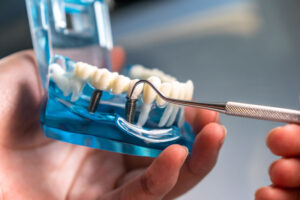If you are struggling with TMJ pain, you may have a disorder of this part of the jaw. While some issues may be minor and manageable, others can affect your daily habits. Routine things such as chewing and speaking can become difficult if you do not get the right help. Relief is possible when you visit your dentist. A dental professional has the knowledge and training to effectively treat even the most severe conditions.
Causes of TMJ disorders
The jaw is designed to withstand constant use. A sliding hinge on either side of the mouth called the temporomandibular joint connects the jaw to the skull. It helps the mouth to open and close for tasks such as eating, talking, and yawning. Pain in this area can occur when a person clenches or grinds their teeth. Blows to the face can also injure this joint. Other causes can be hereditary.
Surgical options
Treating TMJ may require any number of approaches. The dentist will evaluate the pain to decide which approach makes sense for the person’s needs. If there is extensive damage to the joint, the dentist may have to repair it through surgery. Replacement may also be required in extreme cases. Injections and fluid draining may also relieve the person’s pain. Minimally invasive and more involved surgeries are both considerations for treatment.
Taking medication
A more common approach for mild TMJ disorders is to take a regular regimen of prescription drugs. The dentist may first recommend that patient takes over-the-counter medications. If this does not reduce the pain enough to make the person feel comfortable, stronger drugs may be necessary. The dentist can prescribe the right medication to control the irritation and soreness in the jaw. Other drugs may help the patient overcome habits such as teeth grinding. A drug to induce deeper sleep may also treat a disorder of this joint.
Getting therapy
Many patients want to avoid surgery, as these interventions can have risks. Similarly, medications can have negative side effects. The dentist may suggest doing therapy instead. Common options include counseling and teaching the patient how to overcome habits that cause TMJ pain. It may also be effective to stretch the jaw and the muscles in the region. Some people find pain relief by wearing mouthguards or oral implants.
Speaking with the dentist
When it comes to treating TMJ, there may not be one approach that will work for every situation. The dentist will carefully examine each patient to determine the right strategies to combat joint pain. Often, a combination of these treatments may work well. Patients should follow the dentist’s instructions and be consistent in taking medication and doing therapy exercises.
Say goodbye to the pain
Living with a TMJ disorder can be challenging. These dysfunctions of the jaw can affect your quality of life and overall health. It should be clear why it is so important to go to the dentist’s office when you start feeling uncomfortable while you chew or speak. Your dentist will examine your jaw and consider which of these treatments will be the most effective.
Request an appointment here: https://www.preferreddentalcenter.com or call Preferred Dental Center at (210) 822-8500 for an appointment in our San Antonio office.
Check out what others are saying about our services on Yelp: Read our Yelp reviews.




